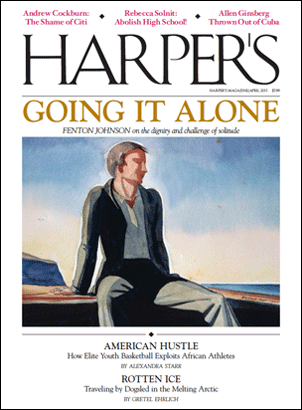[3-minute read]
SPECIAL BONUS QUOTATION BEFORE WE EVEN GET TO THE “HE SAID” AT HAND!

The main article appealed to my loner tendencies, but there was eco-writing, a call to end high schools, AND a basketball feature. A must-have, absolutely killer issue.
“All man’s miseries derive from not being able to sit in a quiet room alone.”
— Blaise Pascal
I have never subscribed to Harper’s Magazine, but it’s a wonderful read. I buy it as a gift and a comfort to myself, approximately whenever a cover story leans out from a random magazine rack and says, Buy me now. My love for this smart American publication isn’t timely or disciplined or even remotely organized; for one pathetic example, I’m just now finishing the August 2013 issue, and returning to its cover piece, a writers forum on the lumpily uncomfortable topic “Are You Sleeping?”. This was a Must-Buy because my nights have been harder work than they should be for a long time. (I’m trying to try easier.)
A year ago last spring, I was forced to kidnap (and to pay the $7.99 ransom for) the April 2015 issue of Harper’s, whose cover story was the long and deeply thoughtful article “Going It Alone: The Dignity and Challenge of Solitude”, by Fenton Johnson. (You can read the whole article here on the magazine’s archives for free.) The piece begins with the quote from Pascal, the 17th-century French polymath/genius, which Johnson follows with a more homely conundrum. He invites us to consider the average bookstore, or daytime TV lineup, or any number of therapists, clergy or Internet advisors, all counseling us on how to figure out our relationships. He compares that to the scarcity of public comment about being by ourselves: “Then try looking for lessons in solitude. You will search for a long while, even though more and more of us are living alone, whether by choice or circumstance…” He’s not talking about loneliness, mainly, but about the virtues, the potential advantages that the “solitaries” among us have in, among other things, following Pascal’s advice. All this, to be sure, in spite of our society’s apparently mandated chattiness, self-exposure and manic extroversion. Little is more terrifying to many of us than being alone with our own thoughts.
And maybe, he suggests, this points toward not just a grudging tolerance for solo time, but the individual and societal necessity of a greater appreciation for solitude: so, about two thirds of the way through the piece, Johnson ups the ante. He tells of a conference at which the speaker had invited attendees to consider how ridiculous or impossible certain social conditions would have seemed just a few decades ago: smoke-free restaurants, a black POTUS¹, or the wide-spread recognition of same-sex marriages.
¹ President of the United States. Michelle Obama, of course, is the FLOTUS, praise be to acronyms!
Johnson accepted that challenge. What he most wanted to envision was a society in which reverence, loving-kindness and spirituality were not the sole province of religious extremists, and therefore dismissed or condescended to by the “realists” of the world. He writes hopefully, in the “Going It Alone” article, of the reclamation of compassion, and other fundamentals of right living, from those who have tarnished, abused or drained the meaning from them. He offers a few of his favourite exemplars and advocates, often American, of these discredited but basic human resources. Fenton Johnson writes,
“I…imagined a world in which the people of compassion have reclaimed the institutions and the language of compassion – words like holy, sacred, sacrifice, divine, grace, reverence, love, God – words that have been handed over to demagogues.
“Could solitaries model the choice for reverence over irony? Instead of conquering nations or mountains or outer space, might we set out to conquer our need to conquer? If that seems a tall order, I offer you Paul Cezanne…, Eudora Welty,…Henry James,…Zora Neale Hurston,…Thomas Merton,…Walt Whitman,…Emily Dickinson….I offer you Jesus, that renegade proto-feminist communitarian bachelor Jew, who reminded us of the lesson first set forth a thousand years earlier in the Hebrews’ holy book: to love our neighbours as ourselves. I offer you Siddhartha Gautama, who sat in solitude to achieve the understanding that everyone and everything are one…”
Fenton Johnson (1953- ) is an American novelist and essayist. His description of Jesus made me gasp and grin like a fool. He has, by choice, lived alone for two decades, and doesn’t seem to feel like a loser because of it. His most recent novel is The Man Who Loved Birds, and his non-fiction Keeping Faith: A Skeptic’s Journey among Christian and Buddhist Monks is now on my long list. A book version of the Harper’s article is forthcoming in a year or so.
